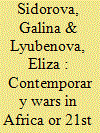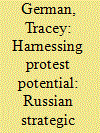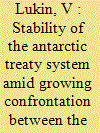|
|
|
Sort Order |
|
|
|
Items / Page
|
|
|
|
|
|
|
| Srl | Item |
| 1 |
ID:
180692


|
|
|
|
|
| Summary/Abstract |
Lately the African continent has been the focus of global attention and discussions on the present and future of Africa, especially with regards to the highly topical questions concerning the global and African state of peace and security. As multiple extremely complex armed conflicts continue to cause chronic instability and vulnerabilities in several African states and regions, they also directly affect the state of international security in the 21st century in an intensively interconnected and globalized world from an economic, political and peace/security perspective. Accordingly, this research article offers an in-depth analysis of some of the major causes and explanations of the existing wars in Africa related to the illicit exploitation of resources, vulnerability, and control. The goal of this work is to reveal and analyze the complexity of 21st-century wars in Africa and their deep interrelated causes by applying the example of the long and banal armed conflicts in the Democratic Republic of the Congo. Thus, the authors argue that the destabilization of the political and socio-economic situation in Africa, and DRC in particular, is directly connected to local and regional conflicts over access to various forms of resources, influence, and power, but also to the artificially created chaos by various interested power parties for expansion, profit, and hope for further profit. In this sense, it has been emphasized that conflicts of so-called ‘low intensity’, artificially maintained over a long period of time, pose no lesser degree of threat to the regional state of peace and security.
|
|
|
|
|
|
|
|
|
|
|
|
|
|
|
|
| 2 |
ID:
174728


|
|
|
|
|
| Summary/Abstract |
The perceived threat posed to Russia from so-called colored revolutions–popular uprisings attributed by Moscow to malign sponsorship by external forces–has become a central theme in Russian security discourse. This article analyses how colored revolutions came to be characterized as a specific threat to national security and how they continue to shape Russian thinking about the changing character of conflict. It explores Russian perceptions of the threat from colored revolutions, using the concept of strategic culture as a framework to analyze these perceptions through an analysis of the Russian military theoretical literature and strategic documents. The article establishes that concerns about non-military means of destabilization reflect continuities in Russian strategic assumptions about adversaries and how they seek to achieve their national objectives. It also reveals the perpetuation of specific narratives about the country’s vulnerability to foreign interference.
|
|
|
|
|
|
|
|
|
|
|
|
|
|
|
|
| 3 |
ID:
188465


|
|
|
|
|
| Summary/Abstract |
TRANSIENT changes in the modern world order have a significant impact not only on the foreign and domestic policies of individual states, even the most isolated ones, but also on vast geographic regions of our planet. One of them is Antarctica, which occupies about 52.5 million square kilometers, or one-tenth of the Earth's surface, around the South Pole. This area of the planet, which has no state or customs borders and no permanent population, industry, agriculture, transport communications, urban settlements, or military bases, is under international control. This control regime was established by the Antarctic Treaty of December 1, 1959 (hereinafter referred to as the Treaty), and other regional acts of international law included in the Antarctic Treaty System. Despite its uniqueness and natural isolation, Antarctica continues to be influenced by world politics and economics.
|
|
|
|
|
|
|
|
|
|
|
|
|
|
|
|
| 4 |
ID:
174059


|
|
|
|
|
| Summary/Abstract |
This paper offers the authors' view of the role and place of Territorial Troops in the system of territorial defense, given the peculiarities of hybrid warfare, and suggests certain ways of raising the efficiency of employing them and building their fighting capability.
|
|
|
|
|
|
|
|
|
|
|
|
|
|
|
|
|
|
|
|
|